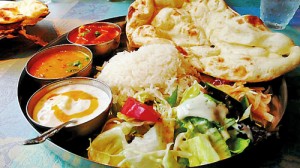Traditional diet: The 10,000-year-old secret to healthy living
“I started looking back instead of looking forward,” explained Dr. N. Gopalakrishnan, making what would seem quite an unorthodox statement for a scientist. A Hon. Director of the Indian Institute of Scientific Heritage, Dr Gopalakrishnan visited Sri Lanka for the first time last week, delivering a series of talks in association with Ashtangir Yoga Mandir on the elements of Yoga. One of the talks titled “Traditional Food vs. Modern Food” questioned and examined the age-old debate we have with regard to diet and healthy eating today.

A vegetarian diet is said to be sattvic, it is linked with purity, goodness, and enlightenment (CC BY 2.0 ‘Vegetarian Curry’ by GracinhaMarco Abundo)
Having followed a vegetarian diet for over 40 years, Dr. Gopalakrishnan delved into the pages of his country’s 10,000-year-old history and heritage, to bring back the secrets of healthy living from the past. “It is the responsibility of a scientist to put forward the knowledge that came from the past,” he said, while trying to apply it to today’s context.
The clash between fast food and the equally popular growing trends of gluten free diets, juice cleanses, etc offer a variety of questions for those who are trying to live a healthy lifestyle which is convenient and flexible with today’s fast paced living.
Having done over 28 years of research both on his home soil and in the West, Dr. Gopalakrishnan doesn’t see the need to rummage through store aisles and shelves in search of ‘health’ food. He is a firm believer in using what is common to one’s surroundings and cultural history, as what was done by generations before. Thus the concept of bringing traditional food back into our diets is what he considers to be a healthier option.
“If someone wants 2000 calories and it is readily available in a capsule, people would be taking it,” he said, emphasising the growing demand for convenient cooking and eating. But while offering short term convenience, such quick fixes cause more harm in the longer run. He illustrated the harm of ready to eat, processed food quite simply, saying; “if our intestine is misused or not used in its normal way it could do the body more harm than good.”
His advice for a healthy diet stems from the concept of vegetarianism taken from Vedic teachings. While vegetarianism is a growing trend among many today Dr. Gopalakrishnan explained the caution one must take even when following a vegetarian diet. “Saatvic foods” are described in Yoga teachings as ripe, organic produce abundant in Prana- the universal life-force that gives life to all sentient beings in both plant and animal kingdoms.
The second category of vegetarian food, prepared with preservatives and highly spiced and flavoured are what needs to be avoided. “Adding preservatives to vegetables and fruits make them co-carcinogenic,” he stated, as even vegetarian food could pose a problem, if prepared incorrectly.
While natural, organic vegetarian fare is what Dr. Gopalakrishnan recommends, seeking out food that would ideally fit in the criteria need not be as expensive and complicated as we may think. The solution to food that is both healthy and easily available lies in the traditional produce of one’s surroundings. “Our common food is what is meant for our body,” he states.


